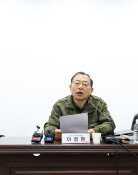Indifference more dangerous than NK nukes
Indifference more dangerous than NK nukes
Posted February. 05, 2013 07:21,
The countdown for North Koreas third nuclear test has started. South Korea, the U.S. and China are mobilizing all of their diplomatic capacities to stop it, but it seems just a matter of time before the test is conducted. Probably due to a learning effect from its previous tests in October 2006 and May 2009, Resolution 2087 of the U.N. Security Council on significant action if North Korea conducts a third nuclear test or pressure by its largest benefactor China seem to have little effect.
The imminent nuclear test is different from the first and second in gravity. The bid for the latest test is the culmination of the Norths efforts to develop nuclear weapons. If Pyongyang demonstrates that its nuclear capability is far more advanced than those of the first and second plutonium-based tests, which only measured one kiloton and two to four kilotons in magnitude, North Korea could start deployment of real nuclear weapons. Another danger is a nuclear test with highly enriched uranium, which the reclusive state has been amassing since 2002. If Pyongyang mass-produces nuclear weapons by using plutonium amounting to more than 40 kilograms and HEU, it will become a real nuclear power. North Korea has developed a long-range ballistic missile with a range of 13,000 kilometers, and in a short time, it could have the technology to reduce the size of its nuclear warheads.
South Korea cannot officially recognize North Korea, but should admit this practical threat and come up with a defense policy to deter the North aggression. If this situation continues, Seoul will have no responses at its disposal and will suffer serious damage due to lack of interceptors even if Pyongyang`s nuclear missiles blanket South Korean skies. Since all nuclear weapons were withdrawn from U.S. forces in South Korea following the 1991 declaration of a nuclear-free Korean Peninsula, the U.S. is providing South Korea an expanded nuclear deterrence through the Pentagon`s nuclear umbrella. Seoul, however, cannot afford to leave its national security in the hands of Washington alone.
South Korea cannot afford its prevailing sentiment of public indifference toward the nuclear threat. The South Korean people did not experience direct damage from the first and second nuclear tests of North Korea, and naively believe that nothing will happen. The notion that North Koreas nuclear weapons are targeting the U.S. is simply false. Pyongyang has never made such a threat, and even if it did, there is no guarantee that it will act on it. The thinking that it will be beneficial for a reunited Korea if North Korea possesses nuclear weapons considering the post-reunification era is highly dangerous in that it could fundamentally jeopardize South Koreas national security.
According to investigative reporting by The Dong-A Ilbo, North Korea and pro-Pyongyang forces in the South colluded each other to reproduce and spread the Norths claims on key political and security issues. The South Korea headquarters of Beomminnyeon, or the Pan-Korean Democratic Coalition, recently sought to endorse North Koreas rocket launch by saying, The North naturally cannot accept the illogical reasoning that if South Korea conducts a launch, it is a satellite, and if the North does it, it is a ballistic missile. The coalition also spread without reservation the Norths claim that the Northern Limit Line, the de facto inter-Korean sea border, is an open attempt to start war designed to transform the Yellow Sea into a battlefield, and that the naval base under construction on Jeju Island is "a hinter nuclear base for the U.S. to aggress on North Korea." The election of certain pro-North Korea figures to the South Korean parliament is evidence of the effectiveness of Pyongyangs tactic to remove the psychological vigilance of South Koreans, which the North has been constantly pushing ahead.







